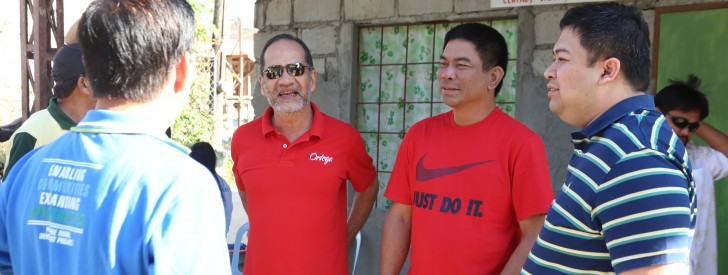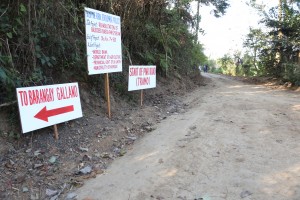 PRDP National Director Emerson Palad (right) joins the review mission team during the site visit in Brg. Balecbec, Naguilian, La Union on February 6, 2015.
PRDP National Director Emerson Palad (right) joins the review mission team during the site visit in Brg. Balecbec, Naguilian, La Union on February 6, 2015. PH govt to build “world-class” infra to spur rural devt
Pugo, La Union—Different crops like long beans, Baguio beans, upland rice, banana, and mangoes thrive in upland villages of Balecbec and Basca in Naguilian and Aringay, La Union respectively.
However, many farmers in the area share the same hardships in delivering agricultural produce downtown especially during the rainy season.
“The path is muddy and slippery, so only carabaos can pass the road during rainy season,” relates Mr. Leonardo Nadlang, 62, who owns some mango trees in his small parcel of land. Aside from mangoes, Mang Leonardo also grows vegetables like Baguio beans, sitao, and cassava.
Mr. Diego Abubo who owns at least 20 mango trees and grows similar crops, shared, “there were instances when my crops got spoiled because we could not deliver them during the rainy season.”
“We just tried to salvage some vegetables that can still be sold, to reduce our losses,” he continued, explaining that one has to pass through a four-kilometer narrow path just to reach the nearest market.
From woeful to hopeful
With this scenario, many farmers from the two barangays are restricted on venturing to more farming opportunities.
“Aside from carabaos, we also hire helpers to haul the sacks of harvested crops for at least P100, depending on the distance of one’s house to the passable road—which is at least two kilometers away in my case,” relates Mang Leonardo.
On the morning of February 6, however, marks a new hope to these farmers who have been waiting for a new road for the last 30 to 40 years. Farmers from Brgys. Balecbec and Basca were gathered in the barangay hall to receive the good news straight from the Department of Agriculture (DA) and the World Bank (WB) about the proposed 7.89-kilometer farm-market-road (FMR) with 30-meter bridge project to be constructed in the upland villages.
DA Undersecretary and PRDP National Director Emerson U. Palad who visited the project site attested to the urgent need for improvement of the said footpath.
“I have been in the area and the rolling dirt road is so narrow and uneven that even four wheel-drive vehicles will have a hard time passing through especially during the rainy days,” he described.
“We are here with the World Bank today to work hand-in-hand in bringing you an FMR project to help ease your woes and help improve your livelihood through better linkage to the market,” continued Palad.
With the upgrading of the road, Mang Diego is now ready to expand.
“I can now plant more crops and easily deliver my produce to the market,” he added with a hint of hope.
The WB team is in Brgy. Balecbec as part of its First Review Mission of Philippine Rural Development Project (PRDP), wherein the team will assess the readiness of PRDP’s regional offices and Local Government Unit (LGU) counterparts on February 5-6 in La Union.
Muddy pathways to “world-class” roads
The project is part of the integration the DA-PRDP is establishing to respond to the weaknesses and needs of the current value chain.
WB Task Team Leader Carolina Figueroa-Geron said that through this project the DA aims to make the agriculture and fishery sectors of the country competitive.
“The roads and irrigation facilities implemented under the project should be world-class and last for at least 20 years,” she continued.
PRDP National Deputy Director Arnel de Mesa added, “While the DA’s mandate is for agriculture development, the FMRs that link communities can spur economic activities beyond agriculture such as transportation and tourism. Roads can provide transformational effects not only in agriculture, but also in tourism and other sectors.”
As part of the review mission, the WB and DA team conducted a contractors’ meeting to ensure that contractors are knowledgeable of the PRDP’s procurement process, requirements, and specifications for undertaking sub-projects.
Palad lauded the North Luzon cluster for being dynamic and efficient.
“You have the biggest pipeline for sub-projects so far pegged at P3.4 billion for infrastructure sub-projects and P95 million for enterprise support activities,” he said.
PRDP—more than Financial Grant
The P27.5-billion project, of which bulk comes from a WB loan, will also utilize national government and LGU counterparts.
Of the total project cost each LGU will propose, 90% will be funded by the PRDP while the local government will cover the remaining 10% for infrastructure sub-projects. For enterprise subprojects, the project will pitch in 80% of the total amount, while the LGU will share 20%.
Additionally, proponent groups who will be assisted through the project will share 20% of the total project cost in cash or kind.
“We expect these infrastructures and enterprise activities to stir the rural economy positively and generate 5% increase in rural incomes yearly,” she continued.
Palad continued that Agri chief Proceso Alcala has always showcased and supported PRDP during his field visits.
“He knows that this project promotes close coordination between the LGU and the DA. We also see the level of enthusiasm and commitment of the LGUs from the places we visit,” Palad said.
While LGUs are active in pushing for rural infrastructures under the PRDP, Geron explained that PRDP is more than building roads, but to capacitate LGUs.
Palad added that the staff of the LGUs also learned in preparing plans, and other step-by-step procedures like vulnerability and suitability assessment of their respective areas.
“When an LGU implements PRDP, it also capacitates the personnel and all the people involved in creating their own plan for interventions under the Provincial Commodity Investment Plan (PCIP).”
“These are the changes that PRDP will bring. I challenge all of you today, especially the Local Government Units to plan and execute good quality and efficient sub-projects under the PRDP so we can maximize this rare opportunity given to us by the World Bank,” Palad continued.
Philippine Agriculture through Climate Change
Aside from being “world class”, Geron said that the PRDP wants to establish climate-resilient roads and infrastructures.
“Under the PRDP, we are upgrading current roads into concrete roads.”
“When PRDP was planned by the DA and WB, the DA noted that it wants the road to be concreted as the government’s response to climate adaptation, since agri-fishery is number one sector affected by climate change,” she added.
“Therefore, the infrastructures under the PRDP are supposed to be designed according to climate resiliency standards,” she continued. (Catherine Nanta, Department of Agriculture)

